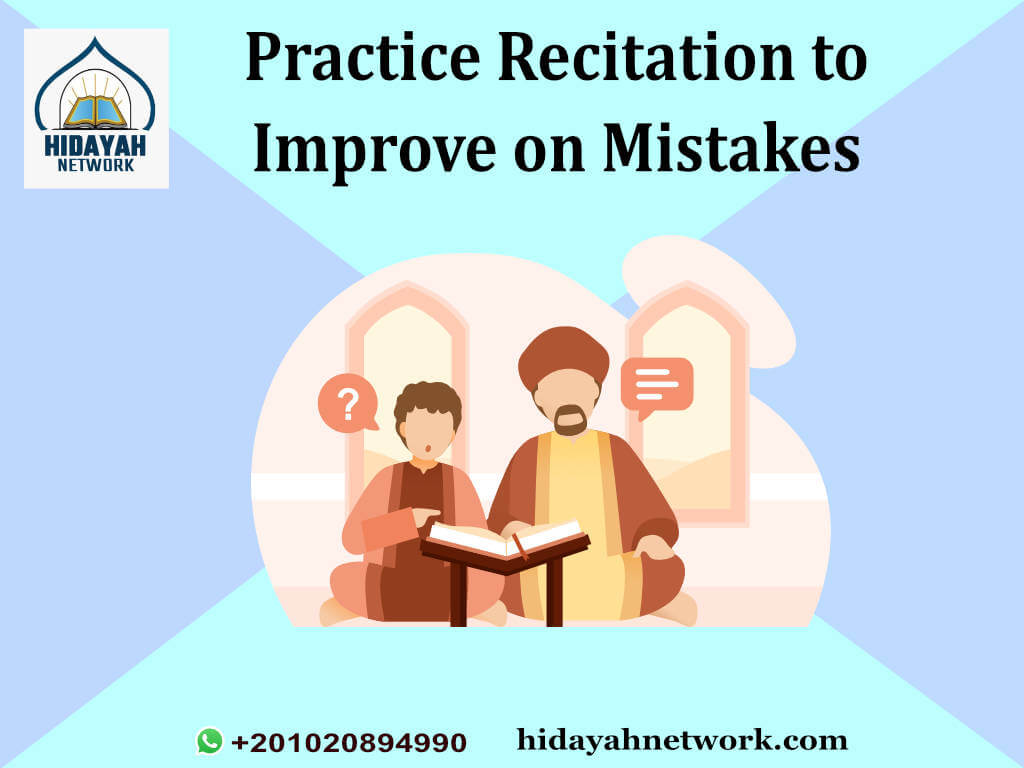How to Learn Quran Recitation Online?

- Hidayah
- Network
- | Role: Hidayah Network

There are numerous ways to learn the Quran with the help of online media and resources. One of the ideal ways to learn Quran recitation online is by finding an experienced and qualified Quran tutor and learning the basics of Noorani Qaida. You can correct your Tajweed and improve your intonation to further make significant progress.
Table of Contents
ToggleGuide to Learn Quran Recitation Online
Let us help you with the best bit of tips to learn Quran recitation online that will add great value to your learning. Learn about these tips in detail here with our expert guidance!
1. Learn Recitation Basics With Noorani Qaida
Noorani Qaida is a tutoring book that serves as a guide for beginners who want to recite the Quran properly. It is one of the most commonly used books to teach and to learn basic guidelines.
The Noorani qaida was written as a curriculum by Shekih Noor Muhammad Haqqani, from India. This book is now one of the most used books to learn recitation principles of the Quran properly.
Noorani Qaida has chapters on letter construction, short and long-sounding words, and vowels. It also has basic Quranic verses for you to practice and to learn to get you familiarized with Qurans Recitation.
To learn recitation, you can start reading various chapters of Noorani Qiada to recite Quran like a pro Qari. With sound, vowel, and vocabulary practice one can easily improve their Quran narration and recitation skills.
Get 40% OFF Now!
2. Practice Recitation to Improve on Mistakes

An Important aspect of learning the Quran’s recitation is to practice out loud. Practicing aloud is a valuable technique for self-improvement and skill betterment to improve quran recitation. Whether you’re learning to pronounce an Arabic letter, or word or recite a verse from the Quran. The act of practicing out loud improves your efforts and makes them remarkably effective.
When you practice aloud, it helps you to listen to the verses you are reciting. Moreover, it provides the opportunity to hear and evaluate your own Qurans recitation in real time.
This self-assessment allows you to identify errors and areas for improvement, It is also beneficial for those people who are shy or want to learn the Quran’s recitation on their own. By listening to your ownself, you can notice the errors in recitation and pronunciation that may otherwise go unnoticed.
By actively listening to your own voice, you can self-correct and make necessary adjustments, ultimately improving your Quran’s recitation. So, don’t hesitate to practice aloud; it’s a powerful tool in your journey towards learning recitation of the Quran.
3. Use Modern Technology and Digital E-Quran
With the advent of modern technology, learning to recite the Quran online has become much easier. The Internet has various websites that have the inbuilt Noorani Qaida and Arabic letters pronunciation software, with voice recordings of each alphabet.
The applications for Quran’s recitation can also be easily downloaded on your mobile phone from Google Play and Apple Playstore. These Applications can help you learn recitation while traveling or on the go.
Many companies have also launched a digital version of the Quran, with an Electric Pen, this device has an inbuilt sensor that on placement reads the Arabic letter or alphabet. It also recites verses from the Quran when placed on a specific ayat (verse).
The Electric Pen’s built-in speaker allows users of any age to listen and improve the recitation of the Quran.
4. Find a Qualified Recitation Tutor to Learn From

Even with the use of modern technology and applications, many people prefer to learn the Quran’s recitation recitation from an expert reciter. This technique has some benefits as the reciter can properly guide you on how to pronounce the exact voice of Arabic letters.
If you’re unsure how can I increase my Quran recitation fluency, let us make it clear that expert Quran reciters have taught hundreds of students in their careers. This experience makes them experts in knowing which words and alphabets beginners get stuck on. Learning from them could make it easier for you to recite the Quran properly and become a qari of quran.
To find a Qari (Qualified Reciter) one can meet the nearest Imam of the Masjid in the area in which they live. The reciters can guide the beginner with all the techniques given in this article.
5. Recite Juz Amma’s Small Surahs for a Start

One of the most important and unique methods to learn recitation is to start the journey in small steps. For this, many expert reciters and teachers refer to start the recitation journey from the Juz Amma ( جزء عم ).
The chapter 30 of the Quran, also called as the Juz Amma ( جزء عم ) has some of the most frequently recited surah’s of The Quran. This Juz of the Quran is easy to learn and to recite as it has surah’s (Chapters) which have small verses.
The Juz Amma ( جزء عم ) has many surahs such as “Al-Kauthar”, “Al- Ikhlas”, “Al-Naas” and “Al-Falaq” which are easy to recite and memorize. These surahs have small verses and are widely recited in salaat throughout the world.
This Juz of the Quran is also where the beginners are taught to recite the Quran. Thus readers can in combination with Noorani Qaida, start reading the small surahs from the Juz Amma ( جزء عم ) to improve their recitation.
6. Learn the Basic Elements of Tajweed
The Arabic Tajweed or pronunciation is one of the most important aspects in the recitation of the Quran. For non-Arabic speaking people many believe that it is difficult to learn this pronunciation. This article gives some of the important guidelines that will make the Tajweed (Pronunciation) easy for you.
As the saying goes “A thousand-mile journey starts with a single step”, Learning of Tajweed (Pronunciation) requires practice and consistency. To learn the Tajweed, there are many videos online and Android or iOS applications with voice software to help you practice.
If you want to learn more quickly, a Quran tutor can guide and supervise you to learn the Tajweed (Pronunciation). Being with a mentor and a supervisor can motivate you to learn and would help you to correct your mistakes.
Listening to recitation regularly would improve your Tajweed and help you to learn recitation quickly.
7. Improve Your Arabic Intonation
The Arabic Intonation is very important in the recitation of the Quran. The rise and fall of voice while recitation is an important aspect. After learning the tajweed rules with examples, learning Arabic Intonation becomes easier for the beginner.
The rise and fall of the recitation takes time for the beginner to get used to. If you want to learn Arabic Intonation you can either take tuition from an expert reciter or listen to Quran recitation of various Surahs (Chapters).
Practicing tajweed daily in Salat and recitation of the Quran can help you improve recitation. Listening to famous reciters is also an important aspect which would help you to learn the Intonation.
Various famous reciters of the Quran such as Dr. Abdul-Rahman Al-Sudais, Saad Al Ghamdi, and Mishary bin Rashid Alafasy, recite the Quran beautifully. Listening to them would greatly help you to learn intonation leading you to greatly improve your recitation.
Try to listen closely to their recitation and understand how beautifully they combine the ups and downs of voice to recite perfectly.
8. Pauses and Rhythm Development
Listening to various reciters, you will feel that various reciters have a beautiful rhythm and are experts in pauses while recitation. These pauses and rhythm in recitation make it beautiful to the listeners and easier to understand.
Pauses, or “waqf” in Arabic, are strategically placed stops in the recitation to convey the intended meaning of the verses accurately. These pauses vary in length and are essential for proper comprehension.
The rhythm development while reciting the Quran makes it easy for the reader to learn where to pause and how to improve it. One way to improve your recitation by correctly learning pauses “waqf” and rhythm development is to record your recitation.
Once you record your recitation of verses from the Quran, you can compare them with famous reciters to critically analyze where you are lacking in the recitation. In this way, you can focus on those aspects and improve your Quran’s recitation.
9. Recite Daily to Become a Good Quran Reciter
As with any skill, Mastering Quranic recitation requires skill and continuous effort. Practicing regularly by yourself or under the supervision of a skilled reciter would improve your recitation skills over time.
Start practicing by reciting surah “Al-Fateha” in the first chapter, as it is the necessary component of each salat and is easy to memorize. Once you feel that you have improved your recitation, then start reciting various other small surahs from the Juz 30.
This gradual increase in the recitation of various surahs will help you to understand the various words, and their pronunciation to improve the recitation. The gradual increase in difficulty will make it easy for you to learn recitation.
Following this practice, you can also start reciting various duas and supplications of Almighty Allah in everyday life such as “Subhan Allah” (سبحان الله) or “Alhamdulillah” (الحمد لله). This will also increase the quality of your recitation.
Practicing recitation from the Quran will help you build confidence and improve your recitation skills over time, Also start listening to the recitation to increase your understanding of Tajweed and Intonation.
Conclusion
As with any skill, learning Quranic recitation requires time and effort. You can best enroll yourself in online Quran recitation classes and study a Quran recitation course for a start! Regular practice sessions, preferably under the guidance of a skilled reciter and a teacher can help refine one’s pronunciation and intonation.
When a person starts on the journey of learning Quran Recitation, one should start with basic pronunciation and gradually progress to more intricate aspects like tajweed (the rules of Quranic recitation). Practice is the cornerstone of this journey. It involves not only the repetition of verses but also the careful consideration of rhythm, melody, and pauses.
The process involves repetition, correction, and refinement until the recitation becomes a beautiful blend of precise pronunciation, rhythm, and heartfelt devotion. With time and practice you can learn Quran’s recitation just like many reciters do.
Most Important FAQs
What are some common challenges in learning Quranic recitation?
Some common challenges include pronunciation errors, difficulty in memorization, and maintaining proper rhythm and pauses. These challenges can be overcome with patience, practice, and guidance from a skilled reciter.
Can I learn Quranic recitation on my own?
While it’s possible to learn the basics of Quranic recitation on your own, it is highly recommended to seek guidance from a qualified reciter who teaches the recitation. This is especially for more advanced aspects of Tajweed. A Qualified reciter can provide valuable feedback, correction, and guidance for a learner.
What is the best age to start learning Quranic recitation?
Whether you are an adult or a child, there is no specific age to start learning the Quran’s recitation. Many children begin at a young age, while adults can start at any time. It’s never too late to start learning, and it can be a journey of religious growth.
How do I find a Quranic recitation teacher?
You can find Quranic recitation teachers at your local community mosques, Islamic centers, or online platforms that offer Quranic education. Look for qualified and experienced instructors who are well-practiced, and skilled and can help you learn recitation and Tajweed rules.
What type of Electronic Devices and Applications can I use to learn recitation of the Quran?
With the advancement in technology, there are various applications and E-Quran available that you can use to learn to learn recitation. Check your nearest mosque or library for a copy of a digital set of E-Quran which will help you learn recitation.

About Author
